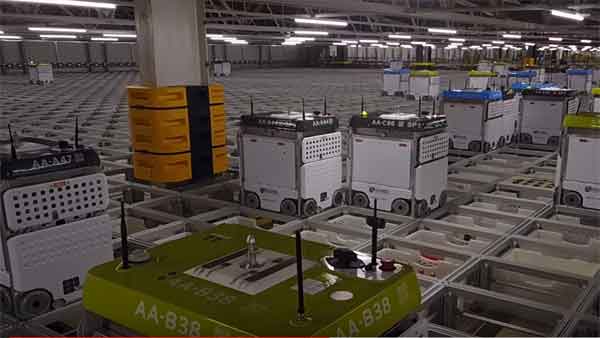| |
|
| |
|
 |
Supply
Chain by the Numbers |
| |
|
| |
- Nov. 9, 2017 -
|
| |
|
| |
|
| |
|
| |
On-Line Grocer Ocado Automates DC for Success; Deal with the Devil on Chinese Aircraft? Carrier Now Offering Minimum Weekly Driver Pay; Net US Store Closings are Very Much on the Rise |
| |
|
| |
| |
| |
200 |
 |
| That's how many workers will ultimately be needed in a new automated distribution center for the UK's largest on-line grocer, Ocado, one third the workforce required in its more traditional DCs and with the same level of throughput. Ocado developed the robotic picking system itself, in which robots sit atop a rectangular grid, with containers beneath the grid holding the 50,000-plus SKUs Ocado sells. Each robot lowers a hook and then grabs and pulls in a container, then moves across the grid to a location where a stationary human associate stands below. After the robot lowers the container, the worker either replenishes the container if it is empty, or selects items from the container for customer orders, before the robot moves on. News last week that the system hit an objective by picking an order of 50 items, including produce, meat and dairy, in just five minutes. Fulfilling a similar order at one of the company's older, mostly manual facilities takes an average of about two hours. Ocado actually wants to see the system to other grocers, but has no takers yet. |

|
|
| |
| |
|
|
|
That is the current annual US trade surplus - yes surplus - in trade with China in the aircraft sector, as Boeing and US parts providers are having continued success against a low maturity Chinese aerospace sector. But as with most such trade areas with China, that may soon be changing. US aviation regulators recently signed a new pact with their Chinese counterparts that effectively opens the door to selling China-made airplanes and parts to the U.S. and other countries, as China hopes its companies can soon compete with Boeing and Airbus. In fact, there are currently about 300 orders for the Chinese made Comac C919 jetliner, which competes with the Boeing 737 and Airbus A320 jets, though almost all from Chinese airlines. The first Chinese planes are expected to enter service around 2020. For Boeing, the new pact opens the door to securing permission to deliver its new 737 Max jet to Chinese airlines. However, the plane maker is set to open a new facility near Shanghai next year in partnership with Comac to paint 737s destined for Chinese airlines and install seats and other fittings. "We know as we're investing there we're also creating a competitor," Boeing CEO Dennis Muilenburg said of China in an interview in May. |
| |
| |
|
| |
| |
$1000 |
 |
That is the new guaranteed wage being promised by a carrier named Bulldog Hiway Express for drivers in its flatbed unit, under a program it calls “Salary Plus.” Drivers for Bulldog's flatbed division currently average $1,300 per week or more than 60 cents per mile for a daily average of $270. Under Salary Plus, drivers will have the opportunity to earn above the minimum $1,000 a week, since the company offers short-mileage runs that maximize daily earning potential and get drivers home for most evenings and weekends. But sometimes as with all carriers the miles aren't there for a driver, and that's when the minimum pay will kick-in - obviously similar in concept to the "universal guaranteed income" ideas many are promoting now for all citizens of a country, state or city. This is just another attempt to deal with the suddenly resurging US truck driver shortage. In its Q3 earnings report, for example, the new merged Knight-Swift commented that "The driver environment is as challenging as we have ever seen." Rates will follow shortly.
|
| |
| |
|
|
|
| |
 |
 |
| |
|
|
| |